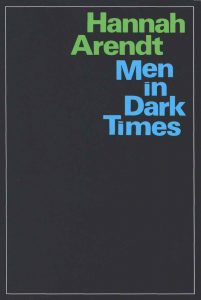Teaching Tolerance
- Posted by arendt
- Posted in education, ethics, Hannah Arendt, Men in Dark Times, personal responsibility
 In Men in Dark Times, published in 1968, Hannah Arendt gathered a set of essays and articles she’d written over the course of a dozen years. These works were “concerned with persons–how they lived their lives, how they moved in the world, and how they were affected by historical times.” She profiled Gotthold Lessing, Bertolt Brecht, Rosa Luxembourg, Walter Benjamin and Isak Dinesen, among others, not because, she wrote, they shared a common vision but because their lives and works illuminated the dark times in which they lived.
In Men in Dark Times, published in 1968, Hannah Arendt gathered a set of essays and articles she’d written over the course of a dozen years. These works were “concerned with persons–how they lived their lives, how they moved in the world, and how they were affected by historical times.” She profiled Gotthold Lessing, Bertolt Brecht, Rosa Luxembourg, Walter Benjamin and Isak Dinesen, among others, not because, she wrote, they shared a common vision but because their lives and works illuminated the dark times in which they lived.
The words, “dark times” in her book’s title came from Brecht’s poem, “To Posterity.”
Truly, I live in dark times!
An artless word is foolish. A smooth forehead
Points to insensitivity. He who laughs
Has not yet received
The terrible news.
What times are these, in which
A conversation about trees is almost a crime
For in doing so we maintain our silence about so much wrongdoing!
And he who walks quietly across the street,
Passes out of the reach of his friends
Who are in danger?
The massacres and slaughters and injustice alluded to in Brecht’s poem were carried out in public, but were “by no means visible to all,” Arendt wrote, because “until the very moment when catastrophe overtook everything and everybody, it was covered up not by realities but by the highly efficient talk and double-talk of nearly all official representatives who, without interruption and in many ingenious variations, explained away unpleasant facts and justified concerns…If it is the function of the public realm to throw light on the affairs of men by providing a space of appearances in which they can show in deed and word, for better and worse, who they are and what they can do, then darkness has come when this light is extinguished by ‘credibility gaps’ and ‘invisible government,’ by speech that does not disclose what is bit sweeps it under the carpet, by exhortations, moral and otherwise, that, under the pretext of upholding old truths, degrade all truth to meaningless triviality.”
Even in the darkest times, she wrote, we “have the right to expect some illumination,” and it may come “less from theories and concepts than from the uncertain, flickering and often weak light that some men and women, in their lives and their works, will kindle under almost all circumstances and shed over the time span that was given to them on earth…”
I was recently invited to create a blog post for Teaching Tolerance’s (TT) web site. When I accepted the invitation, the Southern Poverty Law Center, which hosts TT, had just published its disturbing report on the rise in incidents of hate on school and university campuses. This led to an obvious theme for my writing–about why Hannah Arendt matters in these current dark times and about what educators can gain from studying her works.
The post was published on TT’s web site on February 2nd, and I am reposting it here and invite further commentary.
You might also be interested in an essay by Professor Siobhan Kittago of Tallin University, writing more extensively on the web site of The Integrity Project about Arendt’s Men in Dark Times.

